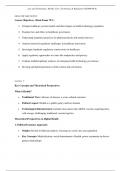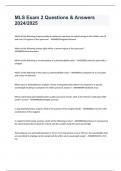Law and Technology- Health, Care, Technology & Regulation (620080-M-6)
HEALTHCARE NOTES
Course Objectives: (Final Exam 75%)
1. Critique healthcare system models and their impact on health technology regulation
2. Examine law and ethics in healthcare governance
3. Understand regulatory practices for pharmaceuticals and medical devices
4. Analyze historical regulatory challenges in healthcare innovation
5. Investigate landmark regulatory controversies in healthcare
6. Apply regulatory approaches to issues like malpractice and privacy
7. Conduct multidisciplinary analyses of emerging health technology governance
8. Develop and defend positions in both written and oral format
Lecture 1:
Key Concepts and Theoretical Perspectives
What is Health?
• Traditional View: Absence of disease, a socio-cultural construct
• Political Aspect: Health as a public policy and law domain
• Technological Infrastructure: Includes innovations like mRNA vaccines requiring ultra-
cold storage, challenging traditional vaccine logistics
Theoretical Perspectives on Digital Health
1. Political Economy Approach:
• Origins: Rooted in Marxian analysis, focusing on social class and capitalism
• Key Concepts: Medicalization, social determinants of health, power asymmetry in doctor-
patient relationships
, Law and Technology- Health, Care, Technology & Regulation (620080-M-6)
• Critical View: Depoliticization of illness, victim-blaming, neoliberalism's impact on
health
2. Sociomaterialism:
• Core Idea: Interactions between humans and non-human actors (e.g., technologies)
• Assemblages: Dynamic configurations of human and non-human elements
• Applications: Understanding how digital health technologies become part of everyday
routines and influence health practices
3. Foucauldian Theory:
• Biopolitics and Biopower: How power operates through managing human bodies
• Clinical Gaze: The medical profession's power to define normalcy and pathology
• Surveillance: Digital technologies extend the medical gaze, monitoring bodies and
behaviors
4. Phenomenology of Human Embodiment:
• Embodied Experience: Focus on lived experiences and sensory dimensions
• Relationality: Bodies and selves as interconnected with other bodies and spaces
• Healthcare Interaction: How sensory knowledge is used in medical practice
5. Theories of Surveillance and Privacy:
• Digital Surveillance: Monitoring and data collection by digital health technologies
• Algorithmic Authority: Algorithms influencing health decisions and selfhood
Healthcare Systems and Health Policy
Healthcare System Definition:
• An interconnected system of resources, people, processes, and decision-making aimed at
delivering healthcare services
, Law and Technology- Health, Care, Technology & Regulation (620080-M-6)
Types of Healthcare Systems:
• Beveridge Model: Universal coverage funded by general taxation, public provision (e.g.,
UK)
• Bismarck Model: Social health insurance, public-private mix (e.g., Germany)
• American Model: Private insurance, voluntary coverage, private provision (e.g., USA)
Healthcare Services Scope:
• Personal Health Services: Inpatient, outpatient, long-term care, and pharmaceuticals
• Collective Health Services: Public health services, administration, and insurance
Levels of Medical Care:
• Primary Care: Community-based (GPs)
• Secondary Care: Specialist care upon referral
• Tertiary Care: Specialized hospital care
• Quaternary Care: Experimental, highly specialized care
Informal Care:
• Care provided outside formal institutions by family or friends
• Increasingly important due to aging populations and chronic diseases
• Can lead to significant physical and emotional burdens on caregivers
Health Policy and Challenges
Health Policy Definition:
• Public policies aimed at achieving specific healthcare goals within a society
• Values: Universality, equity, access to quality care, solidarity
Kissick’s Iron Triangle:
• Trade-offs: Between cost, quality, and access to healthcare
, Law and Technology- Health, Care, Technology & Regulation (620080-M-6)
• Challenges: Aging populations, chronic diseases, health illiteracy, socio-economic
disparities, emerging health actors
"Hidden Health Care in European Health Systems" by Terje A. Eikemo
Main Argument:
• Shift from viewing laypersons as healthcare consumers to recognizing them as primary
providers
Key Points:
1. Socio-Economic Role of Healthcare Systems:
• Impact on distribution of ill health and mortality
• Need for systems to adapt to demographic changes and increased chronic diseases
2. Informal Care:
• Growing reliance on family and community care
• Informal care often outweighs formal care
• Caregiving burden leads to physical and emotional stress, especially for those
balancing careers and caregiving
3. Mental Health and Caregiving:
• High-intensity caregiving (>11 hours/week) linked to reduced mental well-being
• Caregivers in systems with high out-of-pocket payments experience more stress
• Nordic countries show high numbers of informal caregivers but fewer intensive
caregivers
4. Health Policy Implications:
• Need for better support for informal caregivers
• Balance required between formal and informal healthcare systems
• Importance of addressing caregivers’ well-being to sustain healthcare systems






